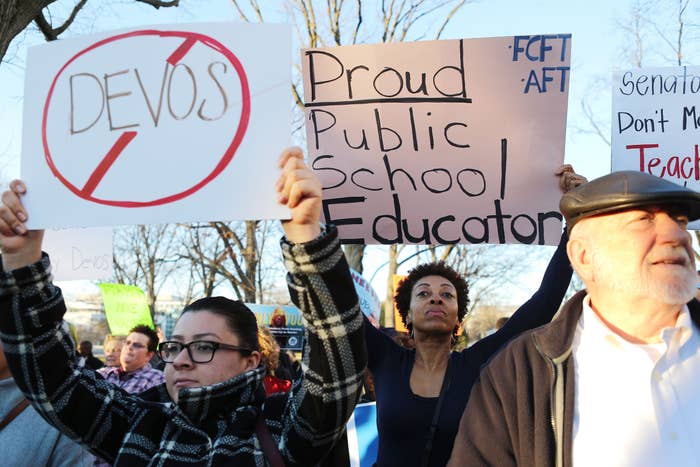
Michigan billionaire Betsy DeVos was confirmed as the new Secretary of Education under President Donald Trump in February after days of intense questioning from several Democrats in the Senate. During her confirmation hearing, senator Al Franken posed questions to DeVos which revealed that she apparently didn’t understand the difference between proficiency and growth (basic education concepts), and DeVos proved she was unable or unwilling to commit to specific policy questions posed by senator Tim Kaine. One of Trump’s more controversial cabinet picks, many educators, parents, students, and politicians agree that DeVos will be a disaster for public schools.
Levels of concern for the future of public education under DeVos are high across the country, but Chicago Public School (CPS) stakeholders have been among the most vocal in their opposition to DeVos’ core policy ideas, especially her preference for charter schools and school voucher programs.
Chicago is right to be worried about the future of its public schools: they are responsible for a remarkable number of children. Serving 381,349 students, CPS serve the third largest district in the nation, outpaced only by New York City and Los Angeles. Of CPS students, 46.4 percent are Latino, 37.7 percent are African-American, 9.9 percent are white, and 3.9 are Asian; and 80 percent receive free or reduced-cost school lunch.
Outside of the classroom, the politics of CPS has always been rife with challenges. The combination of the tense relationship between Mayor Rahm Emanuel and the teachers union, a record-high closing of 50 public schools in 2013, and a crushing $1.1 billion district debt presents exceptional difficulties for educators, parents, and students. Now that DeVos and her pro-privatization plans are helming the Department of Education, the situation only looks grimmer.
DeVos’s policies can be briefly summarized by the concept of “school choice.” She's a major proponent of school voucher programs, where families enter a lottery for the chance to receive a certain amount of funding per year for school children. Students could choose a private, public, or charter school. (DeVos has also long been a champion of charter schools, are are funded publicly but run by private companies.)
According to critics like Senator Pat Murray—who gave a speech to the Senate about school vouchers in 2015—one of the key dangers of school choice is that they “undermine the basic goals of public education by allowing funding that is designated for our most at-risk students to be re-routed to private schools.” The fear is that if families send their kids to private or charter schools with a voucher, money will be taken out of the pockets of public schools that need it, compromising the education of public school students.

Not only do vouchers take money out of the budget for public schools, but studies show that vouchers actually have a negative impact on student achievement. According to a 2016 study on school vouchers in Indiana and Louisiana from the Brookings Institute, “public school students that received vouchers to attend private schools subsequently scored lower on reading and math tests compared to similar students that remained in public schools.”
Joe Gondolfi, who teaches English to sophomores at Solorio Academy, a high school in Chicago’s Gage Park neighborhood, tells Complex that CPS had enough problems of its own before DeVos was even thrown into the mix. A CPS teacher for four years, Gondolfi predicts that DeVos’s plans will only accelerate the injustices within CPS itself: “Some of DeVos's more toxic priorities—school choice, to name one—seem to be in accord with the general trajectory of CPS' policies over the past five years, CPS has primarily closed neighborhood schools and replaced them with selective enrollments and charters. With DeVos in charge, I expect this will continue.”
In 2013, CPS closed 50 public schools, according to DNAInfo Chicago. In 2015, CPS fired teachers and relocated students from Moses Montefiore school, which served special needs students, the Chicago Reporter reported. However, CPS refused to officially designate Montefiore a closed school, as that would mean CPS broke its vow to not close any schools for five years following the 2013 closings.
Disturbingly cold & evil. DeVos is to head our schools & she's mocking our public school free lunch program. Our children don't deserve this https://t.co/DTozlVsdP7
Given the trajectory of CPS school closures in recent years, Gondolfi fears that “the appointment of Betsy DeVos is, if not the final nail in the coffin, one of the most significant factors in the demise of American public education.” Of course, Gondolfi isn’t the only teacher in Chicago who is concerned for his students.
The Chicago Teachers Union (CTU) released a statement almost immediately after DeVos was confirmed, calling her “completely unqualified for the position due to her lack of experience in public schools.” Echoing Gondolfi’s remarks, the CTU wrote that Emanuel’s existing moves toward school privatization “helped pave the way for the nightmare that is ‘U.S. Secretary of Education Betsy DeVos’ and the damage she will do nationally.”
Educators and parents have a keen understanding of how DeVos’ “school choice” plans will impact schools, and so do those most vulnerable to changes in Chicago's education policy: public school students. Just days before DeVos was confirmed, CPS high school student Nathan Petithomme penned an essay for the Southside Weekly, expertly detailing the damage Secretary DeVos could wreak on his education. A student of Lindblom Math and Science Academy, a selective enrollment high school in Englewood, Petithomme opines that “stripping funds from already suffering neighborhood schools will effectively kill public education.”
Citing the unequal distribution of funds throughout CPS and the struggles of the Chicago Teachers Union to negotiate fair contracts, Petithomme argues that conditions will worsen if DeVos’s school choice ideology prevails: “It will harm students who still depend on these public schools for their education, and it will harm minority students and teachers who may be subject to discrimination by private schools based on religion, gender, disability, sexual orientation, or socioeconomic status, inevitably leading to mixed standards and an unfair playing field for student achievement.”
With the ever-rising tide of challenges facing public schools in Chicago, there’s good reason to be anxious about the future of public education, but the situation isn’t without hope. Gondolfi tells Complex that schools can be the key to activating communities. “More than ever, schools need to engage their communities for support,” he says. “There’s only so much power teachers and principals have to advocate for themselves, but if we publicize our successes to counter the narrative of ‘failing public schools,’ we stand a fighting chance.”

